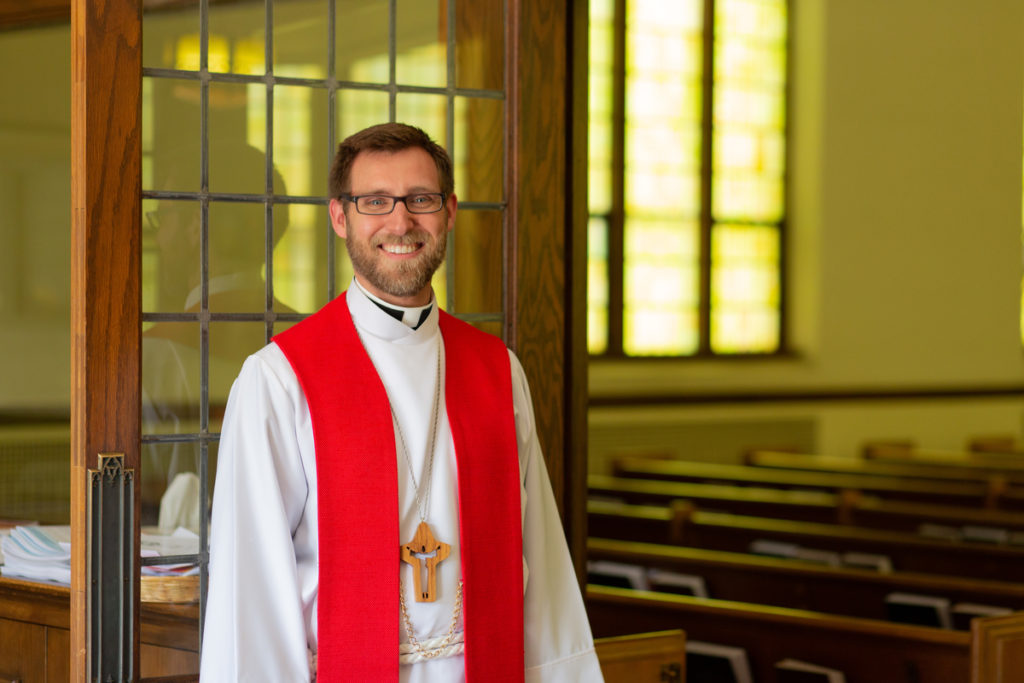Note from our Executive Director: Many thanks to Kevin Haug, ELCA pastor in Texas, for his article about the Sparkle creed. This so-called “creed” has received a lot of attention and stimulated a lot of discussion since its recent use during a worship service in an ELCA congregation in Minnesota. We should all be alarmed over the way in which this statement rejects Biblical teaching and orthodox theology in its promoting the LGBTQ agenda and transgender ideology. We are saddened but not surprised as we read of many ELCA pastors who are praising it as a way to connect the Christian faith with life today. We are also saddened but not surprised by the total silence of ELCA leaders about it.
“Pastor, what are we going to do about this?”
Those words were spoken by one of my octogenarians after she heard two news stories about the “Sparkle creed,” a statement that received national attention because of its use at an ELCA Lutheran Church in Minnesota. The congregation recited it at worship, posted the video online, and it went viral.
The “Sparkle creed” has actually been around for a year or two, but it was not until conservative news sites and blogs discovered it that it caused a bit of an uproar, and that uproar is not without merit. However, care needs to be taken when addressing this issue. I will attempt to show why.
First, let me define creed as a statement of belief.
In a very real way, everyone has a creed of some sort. Individuals have creeds. Organizations have creeds. Individual congregations have creeds. In fact, many biblical scholars say that the first creed was quite simple: Jesus is Lord. Those three words actually led to the death of Christians who would not say the Roman creed: Caesar is Lord.
Because everyone has a creed, one could argue that having a creed is actually a neutral concept. People believe all sorts of things. That they believe them is undisputed and neutral, but what they believe can be problematic and either good or bad. For instance, if I believe that all human beings are endowed by their Creator with fundamental rights, then that is a creedal statement. And I would happily argue that it is a good creedal statement for various reasons. Someone could hold a different position: that human beings are not endowed with rights from a Creator, but that governments decide what rights a person should or should not have. I would argue that this isn’t a very good position to take, but that doesn’t prevent some nations and people from holding it.
To change positions literally requires a conversion process as many, if not most, creedal beliefs are actually statements of faith not statements of science. For instance, science is practiced by using the scientific method: state a hypothesis; test and measure to see if the hypothesis holds water; formulate a theory; test the theory repeatedly. Is the scientific method a true way of getting knowledge? Well, you have to assume that it is. You have to trust that it is. You cannot test the scientific method by using the scientific method. Philosophers call this circular reasoning. Trusting that the scientific method is an accurate way of obtaining knowledge is a creedal belief. It is a deep, foundational belief, but it is a belief none-the-less, and one does not change those sorts of beliefs easily.
Which brings us to the Creeds of the Church, and I am intentionally capitalizing the letter C on both of those words. There is a reason for this as I shall get into shortly.
Within the Christian Church, there are three, recognized, orthodox Creeds: the Apostles’ Creed, the Nicene Creed, and the Athanasian Creed, and what you need to realize about these statements of faith is this: these Creeds were recognized by the whole Church as true affirmations of the Christian faith. They were based in Scripture. They were developed over time or argued over or carefully thought through. They were not put together in a pastor’s office to make a particular group or segment of society feel welcomed or accepted.
In general, they were written to stomp out heresy. They were written to unify a divided Church. They were written to solidify and codify what the Church believed about God the Father, Christ the Son, and God the Holy Spirit. And as such, they are not to be trifled with.
Imagine for a minute if you will, gathering with a group of Christians circa 250 A.D. You are in hiding because Christianity is still not a recognized religion of the Roman Empire. It is the Easter Vigil, the time that it has become traditional for converts to be baptized into the faith. As the baptismal liturgy begins, the presider looks into the eyes of the converts. He begins addressing them and asks them three questions: Do you believe in God the Father? Do you believe in God the Son? Do you believe in God the Holy Spirit? And the converts begin reciting what they have been taught about who God is; who Jesus is; and who the Holy Spirit is. These statements have come together over decades of persecution and trial. Speaking them would immediately set these converts apart from the dominant culture and could lead to arrest and persecution. Such is the nature of the Apostles’ Creed.
Or consider a church divided by various sects all claiming to represent the one true faith. Yet, those beliefs are contradictory at times. Some are not grounded in scripture. Some are off the charts. What does it mean to be a Christian? What are the foundational beliefs? Is this world truly, totally evil? Does only the spiritual count? Was Jesus indeed fully human and fully divine or a really good human being only adopted by God and infused with the divine Spirit? What do you Christians truly believe? And bishops from far and wide gather to hammer such things out. They consult deeply with the scriptures; argue their points vehemently and passionately; and put together a statement of faith which declares: this is it. These are the non-negotiables. It is accepted by the church council and has stood the test of time for centuries. Such is the nature of the Nicene Creed.
The “Sparkle creed” shares none of this history. It was written for entirely different reasons and has not even come close to being vetted by the whole Christian Church on earth. In fact, the majority of the Christian Church on earth would outright reject it.
Therefore, it follows, that it has no standing to replace the Creeds in worship.
I mean: if someone wants to say that they adhere to the “Sparkle creed,” then they can personally say that they believe exactly what is in that statement. If a congregation wants to go so far as to use this creed in worship, then they are free to do so, but I strongly believe it should be introduced as a statement of that individual congregation, not of the Christian Church–it is not “the faith of the Church, the faith in which we baptize.”
For to use it in such a manner is to actually separate one’s self and congregation from the global Church. It is to become myopic and rather self-centered. Arguably, it is creating one’s own personal faith and religion—dare I say one’s own god.
And yes, I am quite aware that I belong to a denomination whose founder separated himself and then many congregations from the larger Church body of the time. The irony is not lost on me; however, Luther didn’t mess with the Creeds. He affirmed them and what they stood for repeatedly. He didn’t tinker with the Creeds or try to change them for he never wanted to split with the Church of Rome. These statements of belief were not up for negotiation or reformation. They were good “as is.”
They still are. They are meant to hold us together despite our disagreements on secondary issues. Trying to put “sparkle” in them only causes more division.
Leave the Creeds alone.




















Kevin,
I want to compliment you on this article. It is thoughtful and well-stated. Thank you for sharing it.
Thank you, Eugene. I hope it is helpful in the discussion of such matters.
Thank you so much for this Mr. Haug. First of all I need to say that I believe that the ELCA has been heading in the wrong direction for quite a while. But this is so off the charts. Being Lutheran is part of me and my family’s history for generations. Please tell us what to do or where we can fit in. Or is leaving the ELCA the only answer?
Hi Pat. I appreciate your question. First, let me say that I really don’t have the perspective to tell you what to do beyond inviting you to pray deeply about it. It’s rather easy to tell people what to do, but I think it is much harder to help people discern what God is calling them to do. That is likely the question I would encourage you to tackle. What is God calling you to do in the midst of this? Many years ago, my grandfather, who was a Lutheran pastor in the ALC, stopped attending his local ELCA congregation and started attending the LCMS church. He offered a very simple reason, “I wasn’t being fed.” Now, I do want to be clear on this: being fed doesn’t necessarily mean having all of your beliefs reinforced. We know that through scripture we are confronted by the Law. Being told you are a sinner hurts! However, we are also comforted and encouraged by the Gospel of justification by grace through faith in what Jesus has done for us. One might successfully argue that within many congregations, there is a lot of Law and not very much Gospel. I personally believe the ELCA has slipped into a “liberal legalism,” and has strayed from the Gospel of justification. When you are hammered by the Law over and over and over again, you get hungry and need to be fed. Are you hearing the Gospel? Is Jesus’ redeeming action being preached Sunday after Sunday after Sunday? That to me is the main question. Which means leaving the ELCA is not the only option IF the Gospel is being preached. But if it is not and you are feeling hammered and beat down every Sunday; if you are starving, then find a place where you are fed. I hope that helps in some fashion. Thanks again for the question.
Pat, yes it is the only answer. I left the ELCA a few years ago and my very simple reason was: the ELCA has veered from the Bible. 2 Cor. 6:17 Therefore, come out from among them..